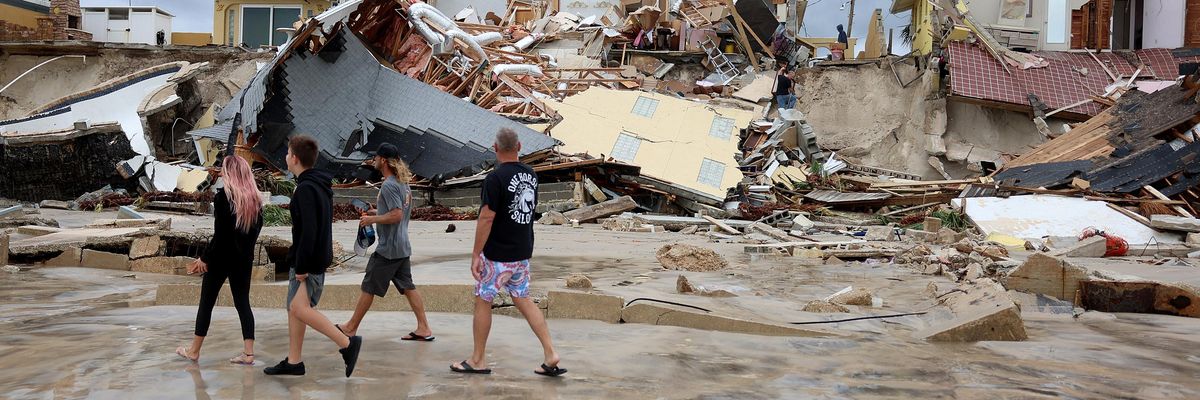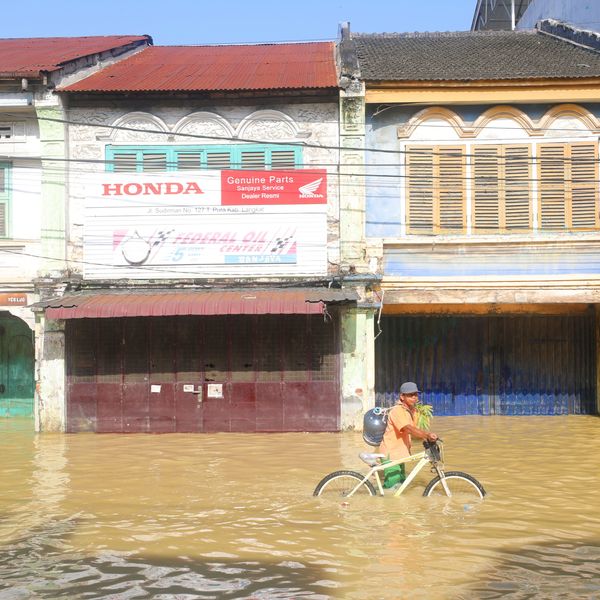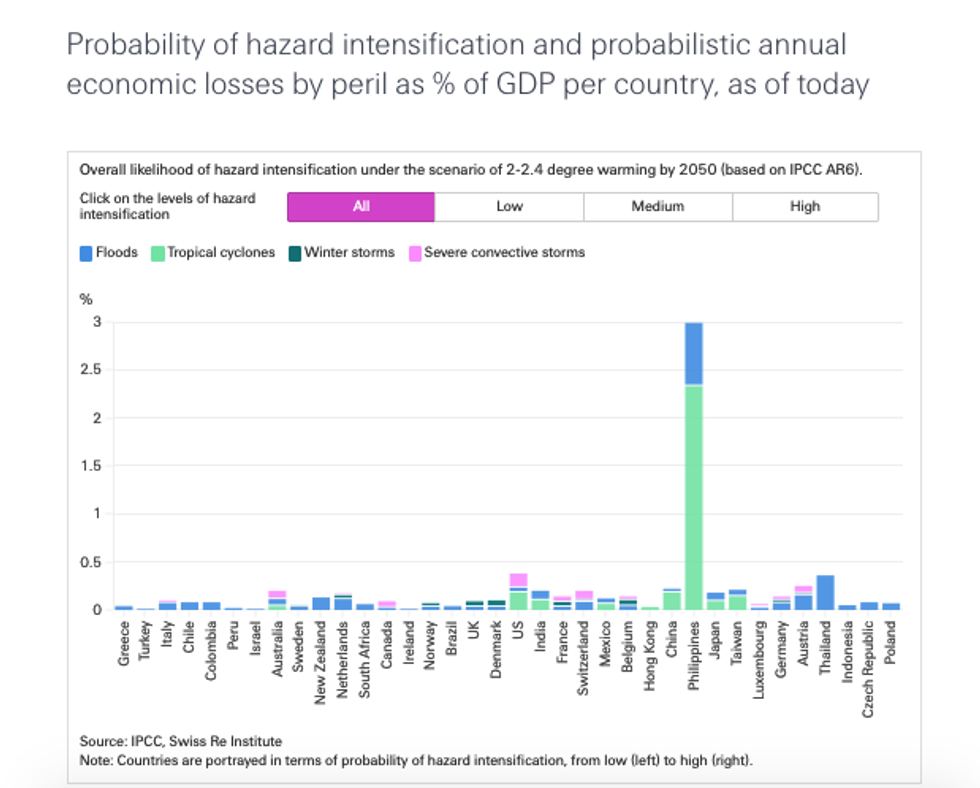
Climate-Fueled Extreme Weather Costs US Nearly $100 Billion a Year: Study
The increased frequency of natural disasters caused by climate change is having major economic effects, according to reinsurance company Swiss Re.
The climate crisis is already having a major impact on the U.S. economy, and the damages are only going to increase.
A new report from the reinsurance company Swiss Re estimates climate change is currently costing the U.S. roughly $97 billion per year. This cost comes from the increased frequency of natural disasters that are connected to climate change, which is driven by the burning of fossil fuels.
"Climate change is leading to more severe weather events, resulting in increasing impact on economies," said the Swiss Re group's chief economist Jerome Jean Haegeli. "Therefore, it becomes even more crucial to take adaptation measures."
Swiss Re looked at data from 2022 and analyzed the impact of natural disasters on the GDP of 36 countries, including the U.S., to establish its findings. The report focused on the effects of floods, tropical cyclones, winter storms, and severe thunderstorms.
While the effects of climate change on the U.S. economy were significant, the country that was most affected by it was the Philippines. The report says climate change impacted 3% of the country's GDP. The U.S. saw a 0.4% impact on its yearly economic output.
The report states that all countries must do whatever possible to reduce greenhouse gas emissions to help lessen the potential economic costs of climate change-related natural disasters. It says countries must also better prepare for the effects of climate change to reduce these costs.
One effect of climate change, increased heatwaves, was not factored into this report. A study from 2022 found that human-caused increases in heatwaves potentially cost the global economy over $29 trillion between 1992 and 2013.
Some experts have suggested the effects of climate change are actually costing the U.S. over $120 billion per year. While there's no universally agreed upon number, it's clear that the costs of the climate crisis are high, and they'll only increase as it gets worse. Decarbonizing the economy isn't a cheap endeavor, but letting climate change spiral out of control would have much more dire economic effects.
An Urgent Message From Our Co-Founder
Dear Common Dreams reader, The U.S. is on a fast track to authoritarianism like nothing I've ever seen. Meanwhile, corporate news outlets are utterly capitulating to Trump, twisting their coverage to avoid drawing his ire while lining up to stuff cash in his pockets. That's why I believe that Common Dreams is doing the best and most consequential reporting that we've ever done. Our small but mighty team is a progressive reporting powerhouse, covering the news every day that the corporate media never will. Our mission has always been simple: To inform. To inspire. And to ignite change for the common good. Now here's the key piece that I want all our readers to understand: None of this would be possible without your financial support. That's not just some fundraising cliche. It's the absolute and literal truth. We don't accept corporate advertising and never will. We don't have a paywall because we don't think people should be blocked from critical news based on their ability to pay. Everything we do is funded by the donations of readers like you. Will you donate now to help power the nonprofit, independent reporting of Common Dreams? Thank you for being a vital member of our community. Together, we can keep independent journalism alive when it’s needed most. - Craig Brown, Co-founder |
The climate crisis is already having a major impact on the U.S. economy, and the damages are only going to increase.
A new report from the reinsurance company Swiss Re estimates climate change is currently costing the U.S. roughly $97 billion per year. This cost comes from the increased frequency of natural disasters that are connected to climate change, which is driven by the burning of fossil fuels.
"Climate change is leading to more severe weather events, resulting in increasing impact on economies," said the Swiss Re group's chief economist Jerome Jean Haegeli. "Therefore, it becomes even more crucial to take adaptation measures."
Swiss Re looked at data from 2022 and analyzed the impact of natural disasters on the GDP of 36 countries, including the U.S., to establish its findings. The report focused on the effects of floods, tropical cyclones, winter storms, and severe thunderstorms.
While the effects of climate change on the U.S. economy were significant, the country that was most affected by it was the Philippines. The report says climate change impacted 3% of the country's GDP. The U.S. saw a 0.4% impact on its yearly economic output.
The report states that all countries must do whatever possible to reduce greenhouse gas emissions to help lessen the potential economic costs of climate change-related natural disasters. It says countries must also better prepare for the effects of climate change to reduce these costs.
One effect of climate change, increased heatwaves, was not factored into this report. A study from 2022 found that human-caused increases in heatwaves potentially cost the global economy over $29 trillion between 1992 and 2013.
Some experts have suggested the effects of climate change are actually costing the U.S. over $120 billion per year. While there's no universally agreed upon number, it's clear that the costs of the climate crisis are high, and they'll only increase as it gets worse. Decarbonizing the economy isn't a cheap endeavor, but letting climate change spiral out of control would have much more dire economic effects.
The climate crisis is already having a major impact on the U.S. economy, and the damages are only going to increase.
A new report from the reinsurance company Swiss Re estimates climate change is currently costing the U.S. roughly $97 billion per year. This cost comes from the increased frequency of natural disasters that are connected to climate change, which is driven by the burning of fossil fuels.
"Climate change is leading to more severe weather events, resulting in increasing impact on economies," said the Swiss Re group's chief economist Jerome Jean Haegeli. "Therefore, it becomes even more crucial to take adaptation measures."
Swiss Re looked at data from 2022 and analyzed the impact of natural disasters on the GDP of 36 countries, including the U.S., to establish its findings. The report focused on the effects of floods, tropical cyclones, winter storms, and severe thunderstorms.
While the effects of climate change on the U.S. economy were significant, the country that was most affected by it was the Philippines. The report says climate change impacted 3% of the country's GDP. The U.S. saw a 0.4% impact on its yearly economic output.
The report states that all countries must do whatever possible to reduce greenhouse gas emissions to help lessen the potential economic costs of climate change-related natural disasters. It says countries must also better prepare for the effects of climate change to reduce these costs.
One effect of climate change, increased heatwaves, was not factored into this report. A study from 2022 found that human-caused increases in heatwaves potentially cost the global economy over $29 trillion between 1992 and 2013.
Some experts have suggested the effects of climate change are actually costing the U.S. over $120 billion per year. While there's no universally agreed upon number, it's clear that the costs of the climate crisis are high, and they'll only increase as it gets worse. Decarbonizing the economy isn't a cheap endeavor, but letting climate change spiral out of control would have much more dire economic effects.


